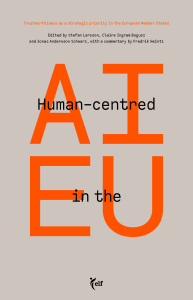The European approach to artificial intelligence (AI) points to ethical considerations, human control and trustworthiness as its core tenets. But how clearly is this approach reflected in the Member States’ strategies?
This anthology analyses to what extent the notions of ethical and trustworthy AI, presented by the High-Level Expert Group on Artificial Intelligence and the European Commission, have influenced AI strategies in Portugal, The Netherlands, Italy, the Czech Republic, Poland, Norway as well as the Nordics overall.
It is clear that the EU-level policies have had an impact on the national level strategies, although sometimes only to the extent that they were published before the national documents. For instance, while some countries, such as Norway and Portugal, have explicitly incorporated aspects from the Ethics Guidelines, others, such as the Nordics, already tended to include questions of trust and transparency, or on ethics as in the case of Poland.
The EU has emphasised AI trustworthiness as both an ethical imperative and competitive advantage. However, implementation is still at the starting line: much depends on alignment between this diverse group of nations, with different priorities, within the single market.
